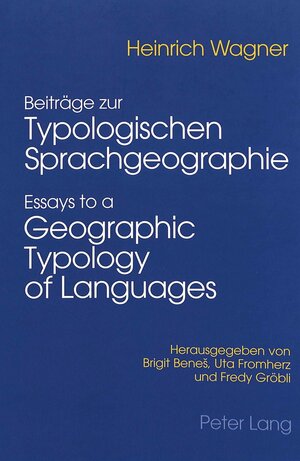
«For all those who are interested in the history of linguistic thought the book is almost a must because it allows the reader to uncover the early network of scholars such as Ernst Lewy, Julius Pokorny and Johannes Hubschmied.» (Thomas Stolz, Sprachtypologie und Universalienforschung)
Beiträge zur Typologischen Sprachgeographie - Essays to a Geographic Typology of Languages
Herausgegeben von Brigit Beneš, Uta Fromherz und Fredy Gröbli- Edited by Brigit Beneš, Uta Fromherz and Fredy Gröbli
von Fredy Gröbli Schaub, Brigit Benes und Uta Teresa FromherzDie typologische Sprachforschung, die auf Wilhelm von Humboldt zurückgeht, vergleicht die Strukturen genealogisch nicht verwandter Sprachen, um deren «innere Form» hinter der Vielfalt der grammatischen Erscheinungen aufzufinden. In seinen bisher verstreut publizierten und deshalb wenig beachteten Beiträgen untersuchte Heinrich Wagner (1923-1988) bestimmte typologische Kategorien in einer grossen Zahl verschiedener Sprachen des ganzen Erdkreises und wies gleichartige Ausdrucksweisen innerhalb weiträumiger Sprachlandschaften nach, die sich beispielsweise über die Britischen Inseln und das westliche Europa und Afrika, im Norden Europas und Asiens und von Altkleinasien nach dem Kaukasus erstrecken. Geleitet hat ihn dabei die Überzeugung, dass Sprachgeschichte nur im Zusammenhang mit Völkergeschichte verstanden werden kann, weil Sprachen historisch gewachsene geistige Organismen sind.
Typological Linguistics, a discipline that goes back to Wilhelm von Humboldt, compares the structures of languages that are not related in their genealogy. It attempts to discover the underlying structure upon which grammatical elements are based. Heinrich Wagner (1923-1988) investigated a number of typological categories that occur in a multitude of languages throughout the entire world. He was able to show that a number of similar methods of expression occur in geographic areas that span, for example, from the British Isles through Western Europe and Africa, the northern parts of Europe and Asia, and from Asia Minor to the Caucasus. He was guided by the conviction that languages are actually historically evolved cultural organisms; thus, the history of language can only be seen in connection with the history of the peoples of the world.
A selection of Wagner’s essays, which were initially printed in a number of different publications and thus never found the attention which they deserve, have been collected here.


